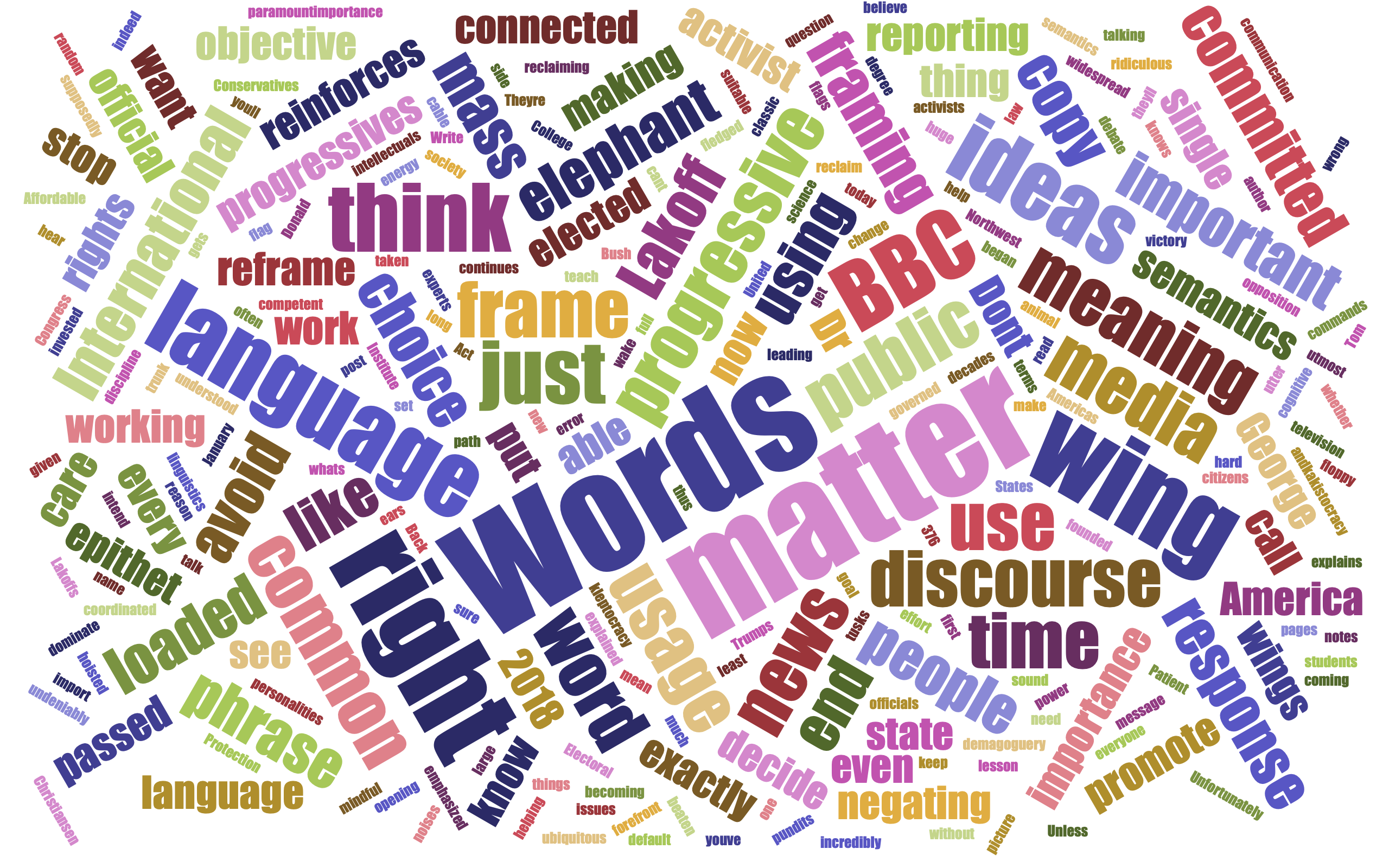Back during the Bush error, when the Northwest Progressive Institute was founded, leading experts in linguistics and and cognitive science (like Dr. George Lakoff) began an effort to teach progressive activists and elected officials how to reframe and reclaim our public discourse from right wing demagoguery.
That work continues today and has taken on a new importance in the wake of Donald Trump’s Electoral College victory, which has put the United States of America on a path to becoming a full fledged kleptocracy and kakistocracy (a state or society governed by its least suitable or competent citizens).
“Framing is about reclaiming our power to decide what’s important,” George Lakoff explained in a January 2018 post. “Framing is about making sure we set the terms of the debate, using our language and our ideas. Conservatives have beaten progressives at this for decades. It’s time for a change.”
What the right wing has long understood is that words matter. Right wing intellectuals and media personalities know that words mean things.
So the right wing has emphasized framing and message discipline to a huge degree. The reason right wing pundits on cable television so often sound coordinated is because they are. They’re all working to promote right wing ideas and keep them at the forefront of America’s public discourse.
Every time progressives use the right wing’s language to talk about the issues, we’re helping them promote their ideas, whether we intend to or not. Even negating a frame reinforces that frame. That’s the first lesson of Lakoff’s classic Don’t Think Of An Elephant, which every progressive activist should read.
In the opening pages of Don’t Think Of An Elephant, Lakoff explains that when he commands his students not to think of an elephant, that’s just what they do. They can’t help it. They picture an animal with a large trunk, tusks, and floppy ears. And that’s because, again, negating a frame reinforces that frame.
The right wing knows that if they can get the language connected to their ideas into widespread usage by the mass media and even their opposition, they’ll be able to dominate our public discourse. So they work very hard at doing just that. It’s why they invested so much energy into coming up with an epithet for the Patient Protection and Affordable Care Act. Their goal was to make that epithet more ubiquitous than the official name given to the law passed by Congress.
Word choice is thus of the utmost importance. Words are like flags: Write or utter the wrong word, and you’ve just hoisted a flag for the other side.
Word choice is incredibly important. Unfortunately, not everyone gets this, which is why from time to time you’ll hear the ridiculous put down That’s just semantics.
“Semantics are about meaning, and meaning is without question the single most important thing in any communication. If meaning has no meaning, then people are just making random noises,” notes author Tom Christiansen. “So semantics is not a matter of no import as they would have you believe, but indeed the one single matter that is of undeniably paramount importance.”
Unless we reframe, we will end up talking about the right wing’s ideas by default. We need to be mindful of our own word choice and call out the mass media when they use loaded language in supposedly objective news coverage.
That’s exactly what a coalition of organizations committed to women’s rights and reproductive justice did this week when they demanded that the BBC stop using the phrase “heartbeat bill” to describe legislation passed by right wing dominated state legislatures to deny women the freedom to decide to end a pregnancy.
“As an international broadcaster with a global weekly reach in 2018 of 376 million people, [the BBC] … has a duty to avoid being complicit, however unknowingly, in the aggressive campaign by anti-abortion extremists worldwide attempting to rob women of their rights and care,” wrote representatives of Marie Stopes International, the Planned Parenthood Federation of America and the International Federation of Gynaecology and Obstetrics.
The BBC’s news director Fran Unsworth dismissively responded: “We would not aim to adopt it as our own description of the legislation… I do not think our reporting can avoid the fact that the phrase is now in common usage.”
That’s the kind of response that makes a right wing intellectual smile.
Operatives working at right wing think tanks know they’ve succeeded in influencing (if not dominating) public discourse when someone in Unsworth’s position decides that language connected to their ideas should continue to be used in copy simply because it is “now in common usage.”
Unsworth’s rationale for rejecting this reasonable request is nonsensical.
Profanities and racial slurs are also in “common usage”, but you generally won’t see such words in the BBC’s copy because the use of such language by a news organization committed to neutral and objective reporting is unacceptable.
“This phrase was chosen very carefully by people who want to end access to legal abortion to insert dangerously emotive language into the common vernacular,” IPPF’s Dr. Alvaro Bermejo noted in response to Unsworth’s comments. “The right thing to do is to stop using it. We call on the BBC to think again.”
Bermejo’s response is spot on. This is exactly how a progressive activist or elected official ought to respond when getting pushback from an institution like the BBC that is resisting abandoning the use of loaded language.
We may not be able to control what the mass media says or uses in their copy, but we can control what we say. We can model the behavior we want to see, and we can be persistent in calling on news organizations that claim to be committed to objectivity to live by that value and avoid loaded language.

